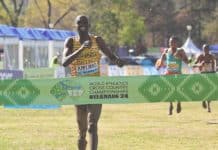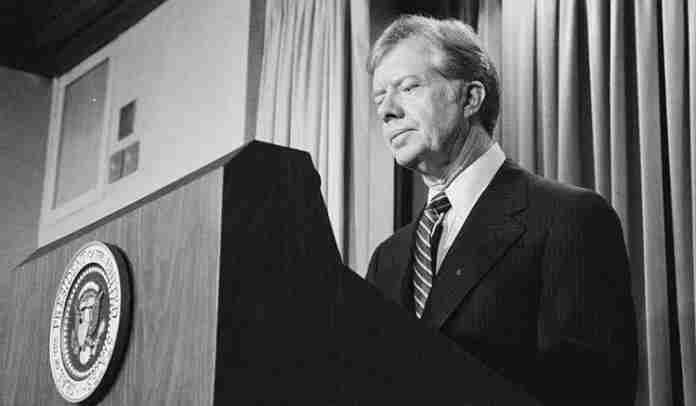Forty years ago, the United States Olympic Committee faced a choice it hopes never to face again. Mike Moran served as the chief spokesman for the USOC for nearly 25 years, from 1979-2003 and remembers that day. He is currently the Senior Media Consultant for the Colorado Springs Sports Corporation.
April 12, 1980, was a day 40 years ago in Colorado Springs that changed the course of history for American Olympic athletes and destroyed the careers of more than two hundred of them who would never compete in future Games.
By a vote of 1,704 to 697 at the Antlers Hotel, the U.S. Olympic Committee’s House of Delegates voted to accede to President Jimmy Carter’s demand for a USA boycott of the 1980 Olympic Games in Moscow. It almost put the USOC out of business. Colorado Springs would never have become “Olympic City USA.”
Ahead of the fateful vote that morning at the Antlers Hotel in downtown Colorado Springs, speeches by Vice President Walter Mondale and USOC Treasurer and former Secretary of the Treasury William E. Simon kept a packed, closed ballroom in suspense and silence, though a vote to stay home from Moscow seemed to be a foregone conclusion after what the USOC had endured since Carter announced the boycott option on January 20.
Carter proposed on that day that the Moscow Olympics be moved to another country or postponed or canceled if the Soviet Union failed to withdraw its troops from Afghanistan within a month. Declaring that “it is very important for the world to realize how serious a threat the Soviet invasion of Afghanistan is,” the President said that if the troops were not withdrawn in a month he would ask the United States Olympic Committee to urge the International Olympic Committee to transfer or cancel the Moscow games. Failing that, the President said he would suggest to the USOC that it formally withdraw American athletes from the games.
The Soviet incursion, though widely debated, wasn’t as well reported then as it would be in today’s massive 24/7 news cycles. Americans knew that the USSR army was in Afghanistan, but that stayed unimportant for most. That is until Carter decided to use the Olympics and American athletes as a political tool.
Mondale had flown into Colorado Springs to address the group, pulling out some powerful rhetoric that sounds ironic four decades later: “History holds its breath for what is at stake is no less than the future security of the civilized world. If one nation can be subjugated by Soviet aggression, is any sovereign nation truly safe from that fate? … If the Soviet lunge toward the most strategic oil-rich spot on earth fails to unite us, what will?”
Simon told the group before the vote, “It is somewhat incredulous that a group of mature persons whom I consider to be among the most patriotic of Americans can seriously discuss defying the President of the United States on a national security issue.” Ever the patriot despite his lofty USOC position and support for American athletes, Simon toed the line, rolling over for the White House and its hollow script.
After those remarks, the USOC’s House of Delegates bitterly accepted the president’s order, voting to withdraw from the Moscow Games. But the vote was far from unanimous, and some feared for the USOC’s future. All who were part of that weekend knew, beyond doubt, they would never forget or feel any better about what they had done. And they despised the fact that the White House had forced them, as the USOC, to stab American athletes in the heart.
Today, this special team is still not recognized by the IOC as an Olympic Team, and I hope that USOPC might do the right thing and deliver a special recognition event for these athletes someday in Olympic City USA.
Carter, desperate for a supportive vote from the USOC, was informed that the International Olympic Charter states that “National Olympic Committees must be autonomous and must resist all pressures of any kind whatsoever, whether of a political, religious, or economic nature . . .” and that the USOC constitution itself maintains “no member of the USOC may deny or threaten to deny any amateur athlete the opportunity to compete in the Olympic Games.” So, Carter decided to use national security as his rationale to force the committee to violate these rules.
The deplorable decision by the USOC came after intense pressure from the Carter administration that included pointed calls to USOC sponsors urging them not to make critical payments to the organization unless it supported the boycott.
The Carter State Department team threatened President Robert J. Kane and Executive Director Col. F. Don Miller in other ways.
Miller was privately threatened with the loss of his U.S. Army retirement benefits (he was a decorated World War II combat officer), and the loss of some of the Olympic Training Center property in Colorado Springs that still belonged to the Defense Department related to the site’s former designation as ENT Air Force Base. Members of Congress hinted at elimination of the USOC’s charitable deductions for contributions.
Reflecting on the boycott years later, I wrote that “466 American athletes sat out the Olympics while 81 nations competed in Moscow: 219 of them never got another chance to make a future Olympic team, their dreams dying in the embers of a fire that proved to be one of the biggest mistakes ever in using sport and athletes as political pawns.”
Eventually 60 other countries joined the United States in staying away from Moscow. A number of Western countries did not observe the boycott, notably Great Britain, France, Italy, and Sweden. In all, about 5,000 athletes representing 81 countries did attend the Games. Protests against the Soviet presence in Afghanistan continued, however. Several of the participating countries refused to attend the opening ceremony, and the Olympic hymn was played at several medal ceremonies, rather than the appropriate national anthem. The Games were also hurt by rowdy behavior from spectators, cheating by officials, and security so intrusive that winners in track events were physically prevented from taking victory laps.
On July 26, 1980, we came to Washington, the U.S. Olympic Team that wasn’t. American athletes and our USOC staff and delegation had nowhere else to go while 5,512 athletes from 81 nations competed in Moscow, in the hollow Olympic Games boycotted by the U.S. and 65 other nations.
During a week of events staged and funded by the financially strapped USOC to celebrate the team, there was little talk of the Games going on in Moscow, no live television in the United States, and little in the newspapers of the day.
On a sweltering July 30 morning on the steps of the Capitol, we heard President Jimmy Carter incredibly thank the athletes for their sacrifice, telling them it would be significant in the effort to force the Soviets out of Afghanistan. To have gone to Moscow, he said, would have validated the USSR’s incursion into Afghanistan in 1979.
When Carter departed, the American athletes, one by one, mounted the steps to receive special medals commissioned and ironically paid for by the USOC, medals eventually recognized in 2007 by the Congress of the United States as Congressional Gold medals, the highest and most distinguished civilian award of our nation.
The boycott had nearly destroyed the USOC. Miller went to Washington and got a commitment of $10 million, based on a matching fund-raising campaign with Congress. He told me and four other USOC executives that he was going to have to furlough us until he got the commitment. I almost took a job at Princeton University, but then Miller asked me to stay. The money came only after Ronald Reagan was elected President in 1981 with the help of future, two-time USOC President Bill Hybl of Colorado Springs, who was part of the Reagan team at the White House.
It ultimately fell on the shoulders of the USOC and Los Angeles Games leader Peter Ueberroth and the success of the 1984 Games to produce stability for the USOC and its bright renaissance that continued today. The Soviets boycotted the L.A. Games in revenge.
Years later, 1984 the late Olympic Greco-Roman wrestling gold medalist Jeff Blatnick, who was on that ’80 team, told a story that startles me even now. He was on an airplane, flying from Bismarck, N.D., to Minneapolis and came upon former President Carter, seated in the first-class cabin.
“As soon as the plane gets up in the air and levels off, he gets up and starts saying hi to everybody,” recalls Blatnick. “I say to the person next to me, ‘I wonder how this is going to be.’ He gets to me, I go, ‘President Carter, I have met you before, I am an Olympian.’ He looks at me and says, ‘Were you on the 1980 hockey team?’ I say, ‘No sir, I’m a wrestler, on the summer team.’ He says, ‘Oh, that was a bad decision, I’m sorry.’”
In the spring of 1996, when it was announced that Carter, a Georgia icon, would run a leg of the official Atlanta Olympic torch near Plains, his hometown, a cadre of 1980 U.S. Olympians who were denied their place in history went to Carter representatives and threatened a major retaliatory response if the former President were to touch an Olympic Torch, wear official clothing, and join in the run.
Carter soon notified the Atlanta Committee for the Olympic Games that he would not participate because of a schedule conflict. He was scheduled by ACOG to carry the torch on July 12, in his hometown of Plains, Ga.
“He was honored to be chosen and he wanted to run, but he can’t because of a scheduling conflict that will take him out of the country,” said a Carter representative.
In June, 2005, I was the Senior Communications Counselor for NYC2012, the bid group for New York City for the 2012 Olympic Games.
In the early morning hours of July 5, 2005 at Rockefeller Center, we had the feed of the final vote among Paris, London, New York, Madrid and Moscow displayed on a big screen for scores of people at a site erected to celebrate if NYC won.
After the first round of voting by the IOC in Singapore, a terse announcement appeared on the big screen.
“Moscow will not advance,” said the IOC spokesman.
Sometimes, what comes around …
Our thanks to Mike for allowing to share his memories of a bad day in Olympic history.
Rich Perelman
Editor
You can receive our exclusive TSX Report by e-mail by clicking here. You can also refer a friend by clicking here.




















